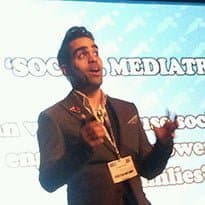Social media “opens you up” to public view, but also gives you the opportunity to inform and inspire people, Dr Ranj told EHI Live 2014.
Giving a keynote speech on the first day of the conference in Birmingham, the star of CBeebie’s ‘Get Well Soon’ and social media enthusiast, said he had fallen into TV by appearing on a Gordon Ramsey show.
Since then, he had taken on other TV commitments while working in a children’s intensive care unit in London, and running numerous social media accounts – including a Twitter stream, Facebook page, and a Pinterest account devoted to his whacky sense of fashion.
“I do all my own updating, and it takes time,” he said; acknowledging that one of the downsides of so much activity was that it took dedication and could be “addictive”.
However, he said the upside was that “you can get young people interested in mental health, in sexual health, in pursuing a career in medicine – which is really humbling.”
Dr Ranj listed his social media ‘dos’ as: know your audience, say something useful, keep it simple, be imaginative, link to other resources and use hashtags to link conversations and ideas, understand the limitations of the media, know your boundaries, show personality, show humanity, and keep it fun!
“Young people love us to have personality,” he said. “They do not want to see anyone too corporate – most of the time, they don’t want to see a doctor, actually – they want to talk to a human being.
“You can get so much more engagement by showing that you are one than you can by pummelling them with messages.”
Dr Ranj then listed his social media ‘don’ts’ as: don’t retweet everything, be too niche, just follow people you like, tweet or post without having a good reason to do it, take it personally, be rude or combative, and feed the trolls!
He acknowledged that using social media meant “putting your head above the parapet” and that some users, especially abusive users commonly known as trolls, would take aim and post unpleasant comments.
But, he argued, this was just part of the nature of a medium that everybody could use, and that trolling could be managed.
He had more serious warnings for doctors about being aware of the need to be careful in a professional capacity, and not to overstep professional boundaries.
“Think about what you say, and make sure it is evidence based,” he said – while pointing out that this was something that doctors should always do anyway. Dr Ranj runs disclaimers on his site advising that he cannot give personal medical advice to individuals.
His advice for other organisations was that if they had services they wanted people to use they should use channels that those people already used; instead of spending time and effort trying to “divert the river” and bring users to them.
He pointed out that 80% of teenagers, and 90% of doctors, already use smartphones, that 70% of internet users already use social media, and that 80% have looked for health information.
“Teenagers are often thought of as a tricky group to reach, but they are right there,” he pointed out, just waiting to be engaged in the right way. “Have fun,” he reiterated. “It’s meant to be social media, for goodness sake.”

